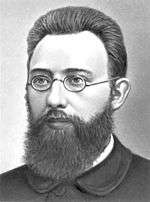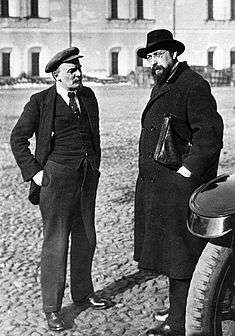Vladimir Bonch-Bruyevich
| Vladimir Dmitriyevich Bonch-Bruyevich | |
|---|---|
 Vladimir Dmitriyevich Bonch-Bruyevich in 1919 | |
| Born |
Vladimir Dmitriyevich Bonch-Bruyevich 28 June 1873 Moscow, Russian Empire |
| Died |
14 July 1955 (aged 82) Moscow, Russian SFSR |
| Occupation | Revolutionary, politician, writer, researcher, historian |
Vladimir Dmitriyevich Bonch-Bruyevich (Russian: Владимир Дмитриевич Бонч-Бруевич; sometimes spelled Bonch-Bruevich; in Polish Boncz-Brujewicz; 28 June [O.S. 16 June] 1873, Moscow – 14 July 1955, Moscow) was a Soviet politician, historian, writer and Old Bolshevik (from 1895). He was Vladimir Lenin's personal secretary.[1] He was a brother of Mikhail Dmitriyevich Bonch-Bruyevich.
Early life

Vladimir Dmitriyevich Bonch-Bruyevich was born in Moscow to a land surveyor family of Polish descent who came from the nobility of the Mogilev province. Between 1884–1889 he studied at the Moscow Institute of Surveying and graduated from the school of land surveying. He returned to Moscow in 1892 and entered the "Moscow Workers' Union" and distributed illegal literature. Since 1895 he was active in the social-democratic circles. In 1896 he emigrated to Switzerland and organized shipments of Russian revolutionary literature and printing equipment and became an active member of Iskra.
Researching dissenters and supporting Doukhobors
One of Bonch-Bruyevich's research interests were Russia's dissenting religious minorities ("sects"), which were usually persecuted to various extent by both the established Orthodox Church and the Tsarist government. In the late 1890s, he collaborated with Vladimir Chertkov and Leo Tolstoy,[2] in particular in the arrangement of the Doukhobors' emigration to Canada in 1899. Bonch-Bruyevich sailed with the Doukhobors, and spent a year with them in Canada. During that time, he was able to record much of their orally transmitted tradition, in particular the Doukhobor "psalms" (hymns). He published them later (1909) as "The Doukhobor Book of Life" (Russian: «Животная книга духоборцев», Zhivotnaya Kniga Dukhobortsev).[3][4][5]
Political activism
Between 1903–1905 he was the head of the expedition of the Central Committee of the RSDLP (Geneva) and one of the founders of the archive. In 1905 he returned to Russia and worked in the newspaper "New Life." In 1905 he participated in the preparation for an armed uprising in Saint Petersburg and organized the underground storage of weapons.
Between 1906–1907 he was the secretary and member of the editorial board of a journal. Between 1908–1918 he led the Bolshevik publishing house "The Life and Knowledge." Since 1912 he was a member of the editorial board of the newspaper Pravda. During this time he was repeatedly arrested, but did not serve a long prison sentence.

In 1917 he was a member of the executive committee of the Petrograd Soviet, the interim editor of the newspaper "The Worker and Soldier" (another name for "Evening Petersburg"). He was managing the affairs of the Council of People's Commissars until October 1920.
Between December 1917 and March 1918 he was the chairman of the Committee against the pograms and in February – March 1918 a member of the Committee for the Revolutionary Defense of Petrograd. From 1918 he was Deputy Chairman of the Board of Medical Colleges. In 1919 he was Chairman of the Committee for the construction of sanitary checkpoints at railway stations in Moscow and the Special Committee for Rehabilitation of water supply and sanitation in Moscow. Between 1918–1919 he was the head of the publishing house of the Central Committee of the Russian Communist Party (Bolsheviks) "Kommunist."
%2C_1918.jpg)
Bonch-Bruevich took an active part in the nationalization of the banks in the preparation of the Soviet government moving to Moscow in March 1918. In 1918 as Managing Director of the Council of the People's Commissars, he endorsed setting in motion the Red Terror.
In 1918 he was elected a member of the Socialist Academy of Social Sciences. After Lenin's death, he did research and authored works on the history of the revolutionary movement in Russia, the history of religion and atheism, sectarianism, ethnography and literature. In the Soviet Union, Bonch-Bruyevich was best known as the author of a canonical Soviet book about Vladimir Lenin, whom Bonch-Bruyevich served as secretary in the years immediately following the Bolshevik revolution in 1917.[6]
Following Lenin's death, Bonch-Bruevich he was one of the key people involved in organising the funeral. He personally opposed the mummification of Lenin's body.[7]
Between 1920–1929 he was the organizer and leader of a farm that supplied its products mostly to the leaders of the Communist party and the government.
Beginning in 1933, he was the director of the State Literary Museum in Moscow. Between 1945–1955 he was the director of the Museum of the History of Religion and Atheism, Academy of Sciences of the USSR in Leningrad.
Bonch-Bruevich died on 14 July 1955. He was buried at the Novodevichy Cemetery in Moscow.
Awards
References
| Wikimedia Commons has media related to Vladimir Dmitriyevich Bonch-Bruyevich. |
- ↑ The Russian Civil War by Evan Mawdsley, Birlinn, 2008
- ↑ O.A. Golinenko (О.А. ГОЛИНЕНКО) "Leo Tolstoy's questions to a Doukhobor" (ВОПРОСЫ Л.Н. ТОЛСТОГО ДУХОБОРУ) (Russian)
- ↑ (Russian)
- ↑ Н. В. Сомин. «Духоборы» (Russian)
- ↑ В.Д. Бонч-Бруевич, Животная книга духоборцев, Санкт-Петербург, 1909. (The Doukhobor Book of Life — Complete Russian book at www.archive.org) (Russian)
- ↑ "The Cheka: Lenin's Political Police", NY, Oxford University Press, 1981, p. 197
- ↑ Tumarkin, Nina (1981). "Religion, Bolshevism, and the Origins of the Lenin Cult". Russian Review 40 (1): 35–46. doi:10.2307/128733. Retrieved 1 April 2014.
|